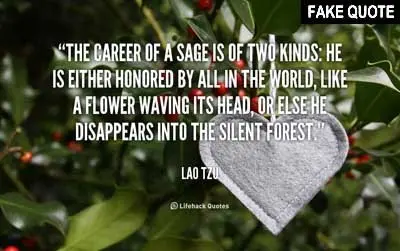|
Tao Te Ching
THE TAOISM OF LAO TZU
|
Fake Lao Tzu Quote"The career of a sage..."
This is NOT a quote from Tao Te Ching:"The career of a sage is of two kinds: He is either honored by all in the world, Like a flower waving its head, Or else he disappears into the silent forest"
This is not a Lao Tzu quote, but it got one thing right. His ideal for the sage — or for anyone of significance — was to modestly hide from praise, and if he did not he just wasn't much of a sage. Already in chapter 2 of Tao Te Ching he stated (my version):
The word career, on the other hand, is misplaced in a text from at least 2,300 years ago. Its origin must be much nearer to our time, and indeed it is. The first occurrence of it that I have found is in a book from 1977: Elegant Sayings, by the Buddhist philosophers Nagarjuna and Sakya Pandit (page 8). So, the book is recent, but the two sources are not. Nagarjuna lived around the 2nd century CE, and Sakya Pandit (usually spelled Pandita) 1182-1251. I found no information about who was the translator. If it is not Tarthang Tulku, it might be Keith Dowman. The quote discussed here is from Nagarjuna's Prajnadanda (The Staff of Wisdom). The problem is that this text of 260 sayings is very unlikely to be by Nagarjuna. Still, the sayings are written in poetic form and have their similarities to Tao Te Ching both in style and content. Therefore it is no mystery how this quote has been mistakenly attributed to Lao Tzu somewhere along the way. None of the few books with the mistaken accreditation is older than 2014, so they are likely to have gotten it from the Internet. In a Google search, the oldest appearance of the quote with an ascertained date is in a blog post from 2011, changing "he" to "she" and ascribing it to Lao Tzu. The same year it started to appear on Facebook. That is quite late, considering the book is from 1977. There are also web pages with the proper accreditation of the quote to Nagarjuna, but they are few in comparison. A Google search shows that there are about 230 of those, but well over 4,000 ascribing it to Lao Tzu (August 2020). So it goes.
Stefan Stenudd September 20, 2020.
More Fake Lao Tzu QuotesThere are many more fake Lao Tzu quotes examined on this website. Click the header to see a list of them.
Fake interview with the authorClick the header to read a "fake" interview with Stefan Stenudd, the author of Fake Lao Tzu Quotes.
About CookiesMy Other Websites:I Ching OnlineThe 64 hexagrams of the Chinese classic I Ching and what they mean in divination. Try it online for free.
Qi Energy ExercisesThe ancient Chinese life energy qi (chi) explained, with simple instructions on how to exercise it.
Life EnergyThe many ancient and modern life force beliefs all over the world explained and compared.
Taoismen på svenska
Other Books by Stefan StenuddClick the image to see the book at Amazon (paid link).
The Greek philosophers and what they thought about cosmology, myth, and the gods. |
 Tao Te Ching
Tao Te Ching Now it's a book, too!
Now it's a book, too! Tao Quotes
Tao Quotes Cosmos of the Ancients
Cosmos of the Ancients Qi — Increase Your Life Energy
Qi — Increase Your Life Energy Aikido Principles
Aikido Principles Life Energy Encyclopedia
Life Energy Encyclopedia Archetypes of Mythology
Archetypes of Mythology Psychoanalysis of Mythology
Psychoanalysis of Mythology Stefan Stenudd
Stefan Stenudd